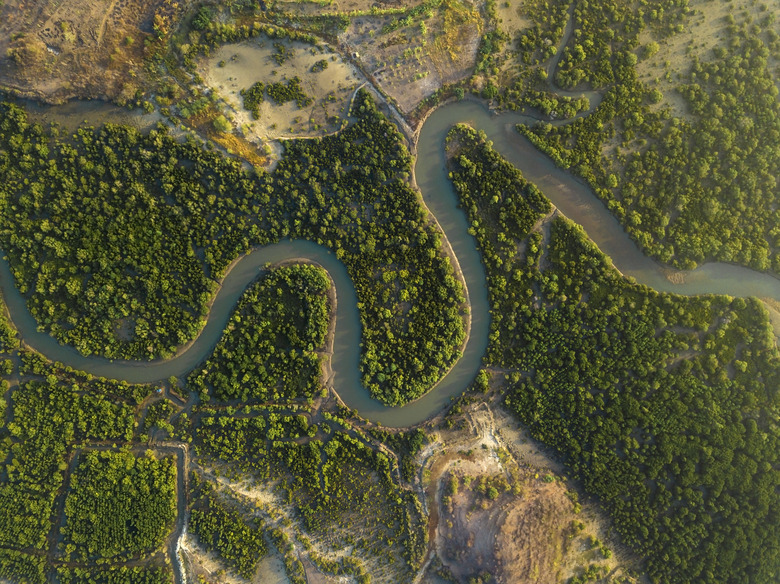Role Of Water In The Ecosystem
Ecosystems are distinct biological societies made up of biotic, living elements like plants, animals and organisms and a physical environment – the abiotic components – such as soil, water, air, sunlight and climate. The physical interactions and symbiotic relationships developed between all these elements in an ecosystem not only define it, but bring distinctive focus to the cycles in nature. The role and function of water in the ecosystem is to provide the lifeblood of the community.
TL;DR (Too Long; Didn't Read)
The importance of water in the ecosystem makes water a key element for sustaining life as it is a foundational building block that supports the biochemistry of all life on the planet.
The Importance of Cycles
The Importance of Cycles
Everything in nature follows a cyclic pattern, which is how the environment constantly replenishes itself. In the physical sciences, the first law of thermodynamics essentially says that energy is neither created nor destroyed; it just changes forms. Nature adheres to this law without fail by continuously recycling all matter in an ecosystem (energy in physical form). The first law of thermodynamics also speaks to the cycles prevalent in nature, and in all life on the planet. For example, sunlight, carbon dioxide and water in the atmosphere become food for a plant during the carbon cycle, releasing oxygen into the environment where it is then used by other plants, animals, insects and humans. The main cycles in an ecosystem include the water cycle, the carbon cycle, and the nitrogen and phosphorous cycles. A break in any one of these cycles can threaten or destroy an ecosystem.
The Role and Function of Water
The Role and Function of Water
Water links and maintains all ecosystems on the planet. The main function of water is to propel plant growth; provide a permanent dwelling for species that live within it, or provide a temporary home or breeding ground for multiple amphibians, insects and other water-birthed organisms; and to provide the nutrients and minerals necessary to sustain physical life. As nature's most important nutrient, people need water to survive.
Water helps to transport oxygen, minerals, nutrients and waste products to and from the cells. The digestive system needs water to function properly, and water lubricates the mucous layers in the respiratory and gastrointestinal tracts. Bereft of calories, water serves as the medium for the metabolic functions and other chemical reactions that produce energy in the body. Water regulates body temperature and serves as padding between the spinal cord and the brain and between the joints in the skeletal system.
The Water Cycle
The Water Cycle
Water continually cycles around the planet in 10 distinctive steps:
- Evaporation happens when liquid water changes to a gaseous state as vapor
- Transpiration represents evaporation of water from plant and tree roots
into the atmosphere
- Sublimation describes how snow and ice change to water vapor without
becoming liquid
- Condensation happens when water vapor becomes water droplets via
cloud formation
- Transportation defines how water moves through the atmosphere in its solid,
liquid or gaseous form
- Precipitation is the water that falls to the planet as ice, rain, snow,
sleet, drizzle or hail
- Deposition is how water vapor changes to a solid state without becoming
liquid, like frost
- Infiltration defines how water seeps into the ground and then
percolates into the water table
- Surface flow describes how rivers, lakes and stream flow to the ocean along
with underground aquifers
- Plant uptake explains that plants only use 1 percent of the water pulled in by their roots, while the rest goes back into the atmosphere
The Importance of Water to All Life
The Importance of Water to All Life
Looking at the planet from space, if the Earth were hypothetically a body, then water would be its lifeblood. Like air, sunlight and food, without water, there would be no life on the planet.
When humans change an ecosystem without thought to maintaining its natural balance, the cycle of life in the ecosystem can skew to one side or other and disrupt the delicate equilibrium necessary to sustaining the community. Some species may die off, and others may thrive, but in the end, the symbiotic relationships begin to break down and the ecosystem dies. Global warming and climate change caused by pollution are on track to do just that, unless humans work together to restore nature's balance.
Cite This Article
MLA
Brenner, Laurie. "Role Of Water In The Ecosystem" sciencing.com, https://www.sciencing.com/role-water-ecosystem-5444202/. 15 November 2019.
APA
Brenner, Laurie. (2019, November 15). Role Of Water In The Ecosystem. sciencing.com. Retrieved from https://www.sciencing.com/role-water-ecosystem-5444202/
Chicago
Brenner, Laurie. Role Of Water In The Ecosystem last modified August 30, 2022. https://www.sciencing.com/role-water-ecosystem-5444202/
